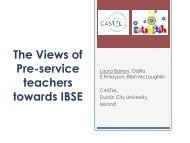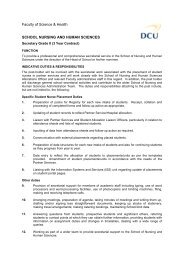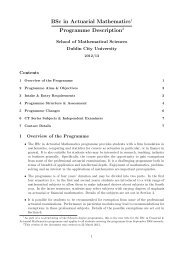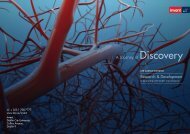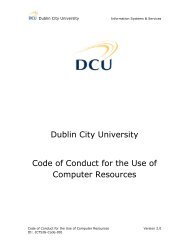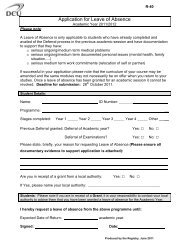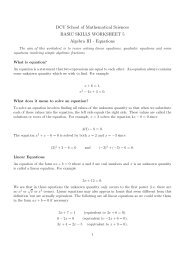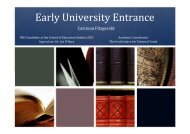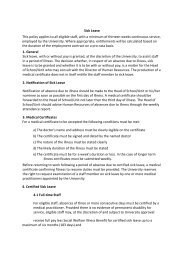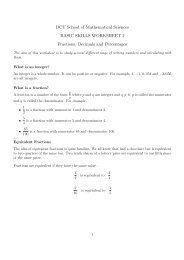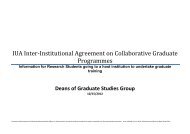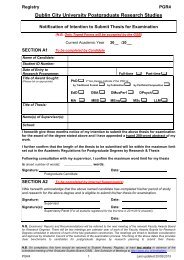Dublin City University Postgraduate Programmes 2012 - DCU
Dublin City University Postgraduate Programmes 2012 - DCU
Dublin City University Postgraduate Programmes 2012 - DCU
You also want an ePaper? Increase the reach of your titles
YUMPU automatically turns print PDFs into web optimized ePapers that Google loves.
15<br />
Application Information<br />
Assessment<br />
Applicants are assessed and ranked based on their performance at<br />
university, and the details provided on their postgraduate research<br />
application. Candidates may be called for interview and/or<br />
assessed on the basis of written work/proposed area of research.<br />
All potential research programme applicants are advised to visit<br />
the following web page to read detailed information on how to<br />
apply:<br />
http://www.dcu.ie/research/graduate_research/how_to_apply.<br />
shtml<br />
Outcome of an Application<br />
Applicants will be updated via email throughout the process.<br />
It is essential that your contact details are correct and current and<br />
your mail filters are set to receive email from pac.ie and dcu.ie.<br />
Please submit all relevant information and respond to any queries<br />
as soon as possible to process your application without delay.<br />
Please allow two-four weeks for your application to be processed.<br />
Applicants with a disability, specific learning difficulty or<br />
significant ongoing health issues apply online through the<br />
<strong>Postgraduate</strong> Application Centre (PAC) www.pac.ie/dcu.<br />
Applicants have the opportunity to disclose their disability on their<br />
application, however it is not a mandatory requirement. Disclosure<br />
of a disability means that the Disability and Learning Support<br />
Service is made aware of the applicants’ details in advance and<br />
works to ensure the support and services available is provided<br />
during their time in <strong>DCU</strong>.<br />
To access any of the supports on offer, registration with the<br />
Disability and Learning Support Service is required, and students<br />
are strongly encouraged to contact this office as early as possible.<br />
No applicant will be disadvantaged as a result of disclosing<br />
information pertaining to a disability.<br />
For more information on the services and support available to<br />
students with a disabilty, please see page 13 for contact details.<br />
Categorisation of Candidate as EU/<br />
EEA (including Swiss, Norwegian<br />
and Icelandic) or non-EU<br />
The designation of a candidate as EU/EEA (including Swiss,<br />
Norwegian and Icelandic) or non-EU determines the fee levels<br />
to which they will be liable.<br />
A candidate will qualify for EU/EEA (including Swiss, Norwegian<br />
and Icelandic) status where they meet one of the following<br />
criteria:<br />
1 They are a national 1 of an EU/EEA (including Swiss, Norwegian<br />
and Icelandic) member state and will be ordinarily resident in<br />
an EU/EEA (including Swiss, Norwegian and Icelandic) member<br />
state for three of the five years prior to the commencement of<br />
the programme.<br />
2 They are a national 1 of an EU/EEA (including Swiss, Norwegian<br />
and Icelandic) member state and have received all their<br />
post-primary education within an EU/EEA (including Swiss,<br />
Norwegian and Icelandic) member state.<br />
3.1 They have been in full-time employment in an EU/EEA<br />
(including Swiss, Norwegian and Icelandic) member state<br />
for three of the last five years prior to the commencement<br />
of the first year of the programme. This applies to candidates<br />
over the age of 23. 2<br />
3.2 They have been ordinarily resident in an EU/EEA (including<br />
Swiss, Norwegian and Icelandic) member state for three of the<br />
five years prior to the commencement of the programme; and<br />
their parents have been in full-time employment in an EU/<br />
EEA (including Swiss, Norwegian and Icelandic) member state<br />
for three of the five years prior to the commencement of the<br />
course. This applies to candidates under the age of 23. 3<br />
All candidates are expected to produce original documentation<br />
to provide evidence of nationality when they come to register<br />
at <strong>DCU</strong> for the first time. Copies of this documentation should<br />
be submitted with your application if available.<br />
Where a candidate qualifies as an EU/EEA (including Swiss,<br />
Norwegian and Icelandic) candidate they may be further entitled<br />
to the reduced EU/EEA (including Swiss, Norwegian and Icelandic)<br />
fee rate in the case of programmes supported under the Graduate<br />
Skills Conversion Programme where they meet the criteria under (1)<br />
above (see page 18 for full list of programmes that qualify). EU/EEA<br />
(including Swiss, Norwegian and Icelandic) candidates qualifying<br />
under (2), (3) or (4) are not entitled to the reduced EU/EEA (including<br />
Swiss, Norwegian and Icelandic) fee rate under the Graduate Skills<br />
Conversion Fund and are liable to the full EU/EEA rate.<br />
Evidence of Nationality (Criteria 1 and 2 above):<br />
• EU/EEA (including Swiss, Norwegian and Icelandic) passport; or<br />
• Original Irish Birth Certificate; or<br />
• Original EU/EEA (including Swiss, Norwegian and Icelandic)<br />
Nationality Identity Card; or<br />
• Official Irish Refugee Status (requires the appropriate original<br />
letter from the Department of Justice, Equality and Law Reform<br />
indicating that the appropriate status has been granted); or<br />
Evidence of Tax Residence/Full-time Employment<br />
(Criteria 3.1 and 3.2 above)<br />
• 3 x P21 forms and<br />
• Work permit for three years, valid for the years of full<br />
employment, and<br />
• Contact details of employer(s) where full-time work was<br />
engaged in for three of the last five years.<br />
Notes<br />
1 A person is deemed to be a ‘national’ of an EU/EEA (including Swiss, Norwegian<br />
and Icelandic) member state if they have: a Birth Certificate or Passport or National<br />
ID Card from an EU/EEA (including Swiss, Norwegian and Icelandic) member state or<br />
an Official Letter confirming Refugee Status in Ireland.<br />
2 Before 1st January in the year prior to commencement of programme.<br />
3 Before 1st January in the year prior to commencement of programme.



